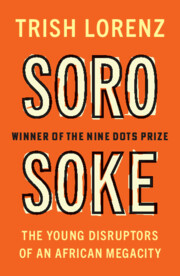Book contents
- Soro Soke
- Soro Soke
- Copyright page
- Contents
- Figures and Illustrations
- About the Nine Dots Prize
- 1 The Soro Soke Generation
- 2 The New York of Nigeria
- Speaking Out: Chekwube Okonkwo on Expressing African Identity
- 3 Cultural Capital
- Speaking Out: Osinachi on Art and Nigerian Identity
- Speaking Out: Priscilla Eke on Feminism
- 4 Challenging Norms
- Speaking Out: Uyaiedu Ipke-Etim on Facing Homophobia
- Speaking Out: Michael Elégbèdé on the Diaspora
- 5 Japá
- Speaking Out: Davies Okeowo on Entrepreneurship
- 6 Entrepreneurs with a Mission
- 7 The New Oil
- Speaking Out: Rinu Oduala on the #endSARS Protests
- 8 The Hashtag Generation
- Speaking Out: Princess Obiajulu Ugwu on Standing for Election
- Speaking Out: Fortunes Oronkwo on the Monetisation of Politics
- 9 Contesting for Power
- 10 We’re in This Together
- Acknowledgements
- Notes
- Soro Soke
- Soro Soke
- Copyright page
- Contents
- Figures and Illustrations
- About the Nine Dots Prize
- 1 The Soro Soke Generation
- 2 The New York of Nigeria
- Speaking Out: Chekwube Okonkwo on Expressing African Identity
- 3 Cultural Capital
- Speaking Out: Osinachi on Art and Nigerian Identity
- Speaking Out: Priscilla Eke on Feminism
- 4 Challenging Norms
- Speaking Out: Uyaiedu Ipke-Etim on Facing Homophobia
- Speaking Out: Michael Elégbèdé on the Diaspora
- 5 Japá
- Speaking Out: Davies Okeowo on Entrepreneurship
- 6 Entrepreneurs with a Mission
- 7 The New Oil
- Speaking Out: Rinu Oduala on the #endSARS Protests
- 8 The Hashtag Generation
- Speaking Out: Princess Obiajulu Ugwu on Standing for Election
- Speaking Out: Fortunes Oronkwo on the Monetisation of Politics
- 9 Contesting for Power
- 10 We’re in This Together
- Acknowledgements
- Notes
Summary
Japá is a Yoruba word that translates as ‘run away’. The word has become part of young Nigerian’s lexicon, defining the desire that many have to experience a new life abroad. Perceptions are that much of the country is looking to leave but the number of African immigrants is vastly overestimated. The share of Africans living abroad has barely increased since the 1960s. In 2017 of the 258 million international migrants worldwide, around 14 per cent of the total were African, equal to just under 3 per cent of the continent’s population. In the same year, 61 million international migrants were European, constituting almost 12 per cent of the population. In the main it is talented Nigerians that are leaving the country. Nigeria sends the largest number of African students abroad – some 95,000 – and ranks fifth in the world in terms of overall number of students in foreign study. Those that do leave continue to have a significant impact on their home nation, not least financially. For four consecutive years, official remittances from diaspora Nigerians have exceeded the country’s oil revenues. And many young African migrants are now seeking to return home and be part of the continent’s renaissance.
- Type
- Chapter
- Information
- Soro SokeThe Young Disruptors of an African Megacity, pp. 66 - 73Publisher: Cambridge University PressPrint publication year: 2022
- Creative Commons
- This content is Open Access and distributed under the terms of the Creative Commons Attribution licence CC-BY-NC-ND 4.0 https://creativecommons.org/cclicenses/



